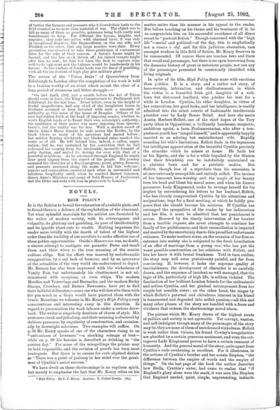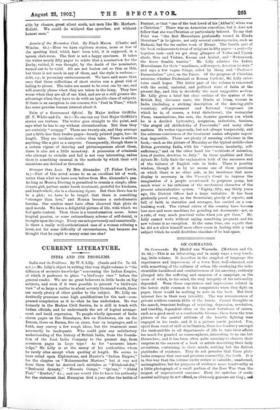NOVELS.
IIIGH POLICY.*
IT is the fashion to bewail the exhaustion of available plots, and to found thereon a defence of the exploitation of the abnormal. Yet what splendid materials for the satirist are furnished by the welter of modern society, with its extravagance and vulgarity, its gluttony and gambling, its pose of intellectuality and its ignoble short-cuts to wealth. Nothing impresses the reader more vividly with the dearth of talent of the highest order than the inability of our novelists to make effective use of these golden opportunities. Ouida's Massarenes was, no doubt, a sincere attempt to castigate our parasitic Peers and recall them and their wives to the true meaning of the maxim noblesse oblige. But the effort was marred by melodramatic exaggeration, by a sad lack of humour, and by an ignorance of the actualities of the very world she endeavoured to depict. Mr. Benson has also been impressed with the wickedness of Vanity Fair, but unfortunately his chastisement is not ad- ministered with scorpions, or even whips. The modern Merdles and Veneerings and Barnacles, and the modern Becky Sharps, Crawleys, and Barnes Newcomes, have yet to find their faithful delineator,—some one who will describe them with the pen much as a Goya would have painted them with the brush. Meantime we welcome in Mr. Keary's High Policy a very conscientious and interesting essay in this direction. In regard to presentation the work labours under a serious draw- back. The writer is singularly destitute of charm of style. His sentences creak and jolt along, and their meaning is obscured by dubious grammar, by angularity of construction, and occasion- ally by downright solecisms. Two examples will suffice. On p.34 Mr. Keary speaks of one of the characters rising to an " enthusiasm of loverness "—a shocking coinage at best— while on p. 69 his heroine is described as drinking in "the aurient day." For some of the misspellings the printer may be held responsible, and the revision of proofs has been most inadequate. But there is no excuse for such slipshod diction as " There was a point of jealousy in her mind over the great- new of Cynthia's social success ."
We have dwelt on these shortcomings in no captious spirit, but merely to emphasise the fact that Mr. Keary relies on his
• • High Fancy. By C. F. Keary. London : T. Fisher Unwin. [68.3
matter rather than his manner in his appeal to the reader. But before touching on his theme and his treatment of it, let us congratulate him on his successful avoidance of all direct resort to "portrait fiction." Though concerned with the "high life "—social and political—of the day, this is emphatically not a roman a clef, and for this judicious abstention, rare amongst workers in this field of fiction, Mr. Keary deserves to be commended. Of course there are touches here and there that recall real personages, but there is no open borrowing from the domestic history of great or notorious people, nor can any of the personages presented be consistently identified with living originals.
In spite of its title, High Policy deals more with emotions than politics. It is a story, and a rather sad story, of hero-worship, infatuation, and disillusionment, in which the victim is a beautiful Irish girl, daughter of a well- born but distressed landlord, who pitches his tent for a while in London. Cynthia, his elder daughter, in virtue of her connections, her good looks, and her intelligence, is readily admitted into the select coterie of fashionable intellectuals presided over by Lady Bessie Brind. And here she meets Austin Herbert-ffollett, one of the chief hopes of the Tory party (then in Opposition), a brilliantly handsome, magnetic, ambitious egoist, a born Parliamentarian, who after a tem- pestuous youth has "ranged himself," and is apparently happily married to an adoring but unintellectual wife. Rapidly sounding his wife's limitations, ffollett finds in the ingenuous but intelligent appreciation of the beautiful Cynthia precisely the stimulus which he misses at home. He hails her as his Egeria, and she is for a while beguiled by the illusion that their friendship can be indefinitely maintained on a platonic basis and for a patriotic motive. But ffollett, though less of a reprobate than his associates, is at once extremely susceptible and entirely selfish. The incense of her innocent hero-worship and the magic of her beauty turn his head and blunt his moral sense, and when his former paramour, Lady Kingsmead, seeks to revenge herself for his neglect by surrendering his letters to her husband, ffollett, who has already compromised Cynthia by his attentions and assignations, begs for a final meeting, at which he boldly pro- poses that she should become his mistress. If Cynthia has estranged the sympathies of the reader by her indiscretion and her fibs, it must be admitted that her punishment is severe. Rescued by the timely intervention of her brother from a terrible impasse, she never attempts to convince her family of her guiltlessness, and their reconciliation is impaired and marred by the uncertainty due to this proudbut unfortunate reticence. To make matters worse, on the occasion of her first re- entrance into society she is subjected to the fresh humiliation of an offer of marriage from a young roue who has put the worst possible construction on her relations with ffollett, and lets her know it with brutal frankness. Told in bare outline, the story may well seem gratuitously painful, and far from convincing. If, however, it lacks the supreme quality of inevitableness, the development of character is so carefully drawn, and the sequence of incident so well managed, that the logic of life, particularly of high life, is seldom violated. The fascination of her brilliant London friends for the enthusiastic and artless Cynthia, and her gradual estrangement from her simple but sensible sister; on the other hand, the stages by which ffollett's paternal and chivalrous interest in his friend is transmuted and degraded into selfish passion,—all this and many other phases of the story are handled with a force and vividness that redeem the shortcomings noted above.
The picture which Mr. Keary draws of the highest strata of politics and society is not agreeable. Yet corrupt, wanton, and self-indulgent though many of the personages of the story may be, they are none of them of unredeemed wickedness. ffollett is weak rather than vicious, his friend Cowley's irregularities are glorified by a certain generous sentiment, and even the out- rageous Lady Kingamead proves to have a certain remnant of humanity. And the general moral of the story, quite apart from Cynthia's rude awakening, is excellent. For it illustrates, in the actions of Cynthia's brother and her cousin Stephen, " the difference between the empire of words and the empire of things." On the last page of the book the author describes how Stella, Cynthia's sister, had come to realise that " if England's glory alone were the mark, it was men like Stephen that England needed, quiet, simple, unpretending, indomit- able by chance, great silent souls, not men like Mr. Herbert- ffollett. We could do without fine speeches, not without honest men."







































 Previous page
Previous page